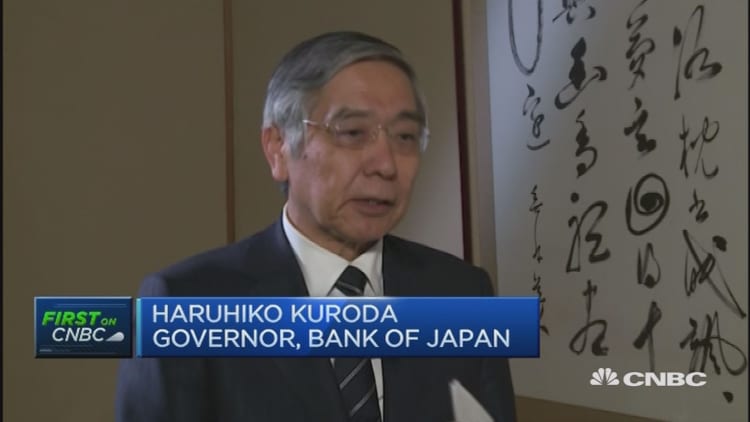
The Bank of Japan still has "enough ammunition" to hit its elusive 2 percent inflation target, Governor Haruhiko Kuroda said, amid some criticism the central bank's negative interest rates policy had failed to deliver.
Speaking after a two-day Group of Seven (G-7) meeting in Sendai, Japan, ended on Saturday, Kuroda said the sharp decline in commodity prices, including the slump in crude oil, had forced major economies to push back their inflation targets.
But he indicated he remained confident Japan could hit its 2 percent target – which it adopted in 2013 and has delayed three times so far - within the current time-frame of the first half of fiscal 2017.
"I think, yes, we have enough ammunition," Kuroda said, when asked whether the BOJ had sufficient monetary policy options, or "ammunition," left to achieve the target. "If necessary, we can further ease our monetary conditions in three dimensions. Quantitative, qualitative and interest rates."
Kuroda did not give specific examples of how these policy levers could be used going forward.

The central bank shocked global markets on January 29 when it introduced negative rates for the first time in order, it said, to keep the "conversion of the deflationary mindset" on track.
This followed the BOJ's decision in October 2014 to expand its quantitative and qualitative easing (QQE) program, under which makes large-scale purchases of Japanese government bonds in order to push down real interest rates.
But some critics have cited lackluster Japanese data in the ensuring months as evidence negative rates hadn't delivered the economic boost the BOJ hoped, while the yen had rocketed, in part as a result of the carry trade losing its appeal.
First-quarter gross domestic product growth, released May 17, came in at an annualized 1.7 percent, surprising markets by substantially beating Reuters poll expectations of a 0.2 percent rise.
The domestic demand contribution to GDP inched up 0.2 percentage points thanks to higher spending on televisions and recreation, as well as food and beverage, noted a government official, Reuters reported.
But some commentators put the improvement down to the February leap year, which provided an extra 1.1 percent additional spending time for Japanese consumers that month.
Capital expenditure (capex), released at the same time as GDP, declined 1.4 percent on-year, the fastest pace of decline in almost a year and worse than economists had expected. The government's consumer confidence index for April, meanwhile, fell 0.9 percent on-month.

Kuroda said on Satuday, however, that the GDP figures showed that Japan was on a "steady yet somewhat slow or moderate recovery path."
"Consumption showed a fairly strong figure. The leap year may be a factor but still I think consumption has been fairly resilient based on strong increase of employee income," he told CNBC. "Fixed investments in the corporate sector were very strong in the last two quarters, third quarter and fourth quarter of last year."
The central bank governor dismissed suggestions that the BOJ's January move to negative rates had been ineffective, saying he expected personal and business investment to expand in the future.
"Already the interest rate has declined quite significantly from short-term to longer-end and the banks' lending rate to the household and the corporate sector have also declined quite significantly, so that naturally housing investment and corporate fixed investment will be further stimulated and increase further in due course," he said.
Kuroda told CNBC that if the dramatically stronger yen put pressure on Japan's recovery, the BOJ "would not hesitate to further ease our monetary policy."
The currency has surged more than 10 percent against the dollar this year and is currently trading around an 18-month high. A stronger yen hurts Japanese exporters by making their goods more expensive, while also weighing on inflation by making imported goods cheaper.
"Our policy is really targeted to the inflation rate but, of course, the inflation rate is affected by many factors, including output gap, inflation expectations and so on and so forth. They in turn could be affected by exchange rate so on and so forth," Kuroda said.
"So we do not have a policy to target to exchange rate but if various factors including the exchange rate affect for instance inflation expectations or underlying inflation trend, and we judge it necessary, then we will not hesitate to further ease our monetary policy."




